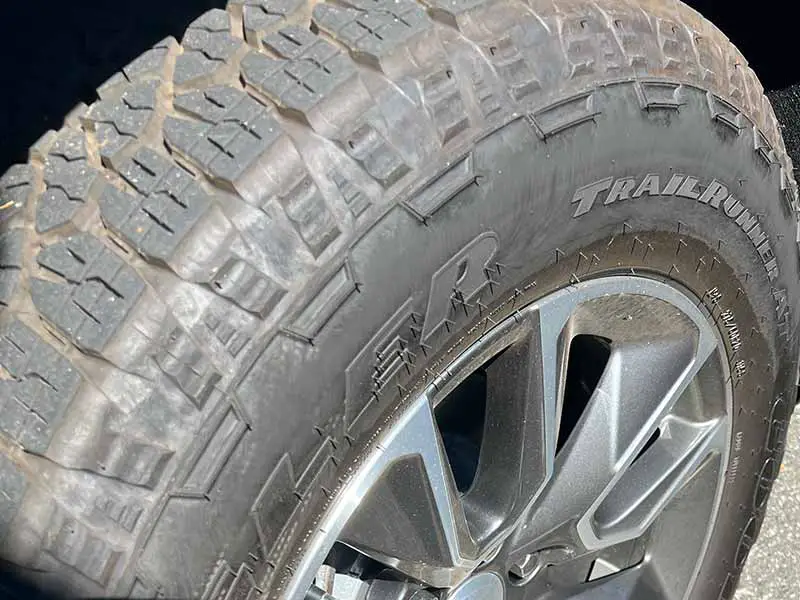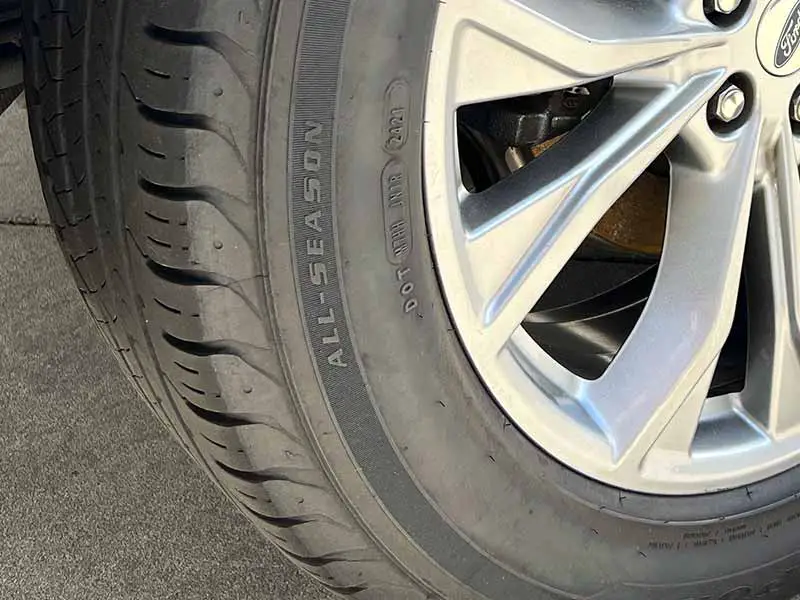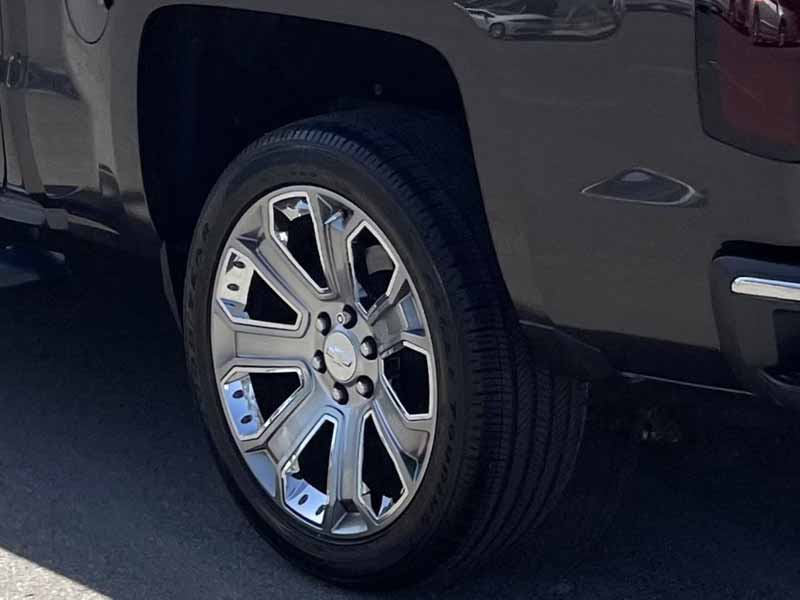When it comes to driving, the tires you choose can make all the difference. Whether you’re cruising on the highway or tackling rugged terrain, understanding how your tires perform is crucial.
If you’re pondering over all-terrain tires for your regular highway drives, this article will shed light on whether they’re the right fit for your vehicle and driving style.
Are All-Terrain Tires Good For Highway Driving?
All-terrain tires can be suitable for highway driving, offering good traction and durability. However, they may not provide the same level of comfort and fuel efficiency as dedicated highway tires.
In this article, we explore the unique features of all-terrain tires, compare them with highway tires, and examine their performance in various conditions, helping you decide the best tire type for your highway driving needs.

Understanding All-Terrain Tires
When it comes to choosing tires for your vehicle, understanding the different types available is key. In this section, we’ll dive into what all-terrain tires are and how they stack up against highway tires.
What Makes All-Terrain Tires Unique?
Design and Features:
- Tread Pattern: All-terrain tires boast a more aggressive tread pattern compared to highway tires. This design offers better traction on varied surfaces, from muddy trails to snowy roads.
- Sidewall Construction: They often feature reinforced sidewalls which provide additional support, particularly useful in off-road conditions.
- Versatility: Designed to handle a mix of driving surfaces, all-terrain tires are a jack-of-all-trades, providing a balance between off-road toughness and on-road stability.
For a deeper dive into the specifics of all-terrain tires, check out What are All-Terrain Tires?
How Do They Compare to Highway Tires?
Design Intent for Highway Tires:
- Smoother Ride: Highway tires are engineered for comfort on paved roads. They typically have a less aggressive tread pattern, focusing on a smooth, quiet ride.
- Fuel Efficiency: With less rolling resistance compared to all-terrain tires, highway tires can improve your vehicle’s fuel economy.
- Wet and Dry Performance: They are optimized for consistent performance in typical road conditions, including wet and dry surfaces.
Practical Considerations
When it comes down to it, choosing between all-terrain and highway tires involves considering your driving habits and needs:
- Where You Drive: If you frequently encounter off-road conditions or rough terrain, all-terrain tires are a solid choice. For primarily city or highway driving, highway tires might be more suitable.
- Comfort vs. Capability: All-terrain tires offer a balance between off-road readiness and on-road comfort. However, for pure highway driving, highway tires will likely provide a more comfortable ride.
For more insights on the types of tires best suited for different vehicles, explore Types of Truck Tires.

All-Terrain Tires for Daily Driving
Now that we’ve got a good grasp of what all-terrain tires are all about, let’s address a common question: Are they a good fit for daily driving, particularly on highways?
Highway Driving with All-Terrain Tires
Noise and Ride Comfort:
- Noise Level: One of the trade-offs with all-terrain tires is increased road noise. The aggressive tread pattern that makes them great for off-road adventures can also lead to a hum on highways.
- Ride Quality: While they’re built for durability, all-terrain tires may not provide the same level of ride comfort as highway tires, especially at higher speeds on smooth roads.
Handling and Stability:
- Responsive Handling: All-terrain tires are designed to be responsive in a variety of conditions, which translates to reliable handling on highways.
- Stability: They can offer good stability, but keep in mind that the stiffer sidewalls might affect the smoothness of the ride.
For a comprehensive list of the best all-terrain tires suitable for daily driving, consider browsing 10 Best All-Terrain Tires for Daily Driving.
Balancing Needs and Preferences
Choosing all-terrain tires for highway driving isn’t a one-size-fits-all decision. It’s about balancing your needs and preferences:
- Versatility: If you value a tire that can handle both your daily commute and weekend adventures, all-terrain tires are a versatile choice.
- Comfort Priority: For those who prioritize comfort and quiet on long highway drives, the smoother ride of highway tires might be more appealing.
Durability and Maintenance
Longevity:
- All-terrain tires are generally built to be tough and durable. However, their lifespan on highways might differ from their performance off-road.
Maintenance:
- Regular maintenance, like tire rotations and alignments, is crucial to maximize the life and performance of any tire, including all-terrain options.
Durability and Longevity
A key factor in choosing tires is how long they’ll last. Let’s compare the durability and longevity of all-terrain tires to highway tires, especially considering their use on highways.
Lifespan of All-Terrain vs. Highway Tires
All-Terrain Tire Longevity:
- Tough Build: All-terrain tires are designed to withstand rough conditions, which can translate to a longer life even on highways.
- Wear Patterns: However, the aggressive tread may wear differently when primarily used on highways, potentially affecting longevity.
Highway Tire Durability:
- Optimized for Roads: Highway tires are specifically made for road use, which can mean more even wear and potentially longer tire life when used exclusively on highways.
For an in-depth comparison of tire longevity, our article Do All-Terrain Tires Last Longer Than Highway Tires? provides valuable insights.
Factors Affecting Tire Life
Several factors can influence how long your tires last, regardless of whether they’re all-terrain or highway tires:
- Driving Habits: Aggressive driving, frequent stops, and high-speeds can shorten tire life.
- Maintenance: Regular rotations, proper inflation, and alignments are crucial for maximizing tire life.
- Road Conditions: Frequent driving on rough or uneven surfaces can lead to quicker wear.
Making Your Tires Last
Tips for Extending Tire Life:
- Regular Inspections: Check your tires regularly for signs of wear, damage, or uneven patterns.
- Proper Inflation: Keeping tires inflated to the manufacturer’s recommended levels can prevent premature wear.
- Balanced Driving: Avoiding aggressive driving habits can help extend the life of your tires.

Fuel Efficiency Considerations
When it comes to choosing tires, fuel efficiency is an important factor for many drivers, especially those who spend a lot of time on highways. Let’s delve into how all-terrain tires compare to highway tires in terms of fuel economy.
Impact of All-Terrain Tires on MPG
Rolling Resistance:
- Higher Rolling Resistance: All-terrain tires typically have a higher rolling resistance due to their aggressive tread pattern, which can lead to reduced fuel efficiency.
- Weight Factor: These tires are often heavier, further contributing to decreased miles per gallon.
Highway Tire Efficiency:
- Lower Rolling Resistance: Highway tires are designed with lower rolling resistance, which can positively impact fuel efficiency, making them a more economical choice for frequent highway drivers.
To understand this concept in more depth, check out All-Terrain vs Highway Tires MPG.
Real-World Implications
Fuel Cost Over Time:
- While the difference in MPG might seem small, it can add up over time, especially for those who drive long distances regularly.
Environmental Considerations:
- Improved fuel efficiency not only saves money but also reduces your carbon footprint, an important consideration in today’s environmentally conscious world.
Balancing Performance and Efficiency
Choosing the Right Tire:
- If fuel efficiency is a top priority for your highway driving, highway tires might be the more suitable option.
- For drivers who need the versatility of all-terrain tires, being aware of the trade-off in fuel efficiency is important.
Comparing Performance in Different Conditions
When selecting tires, it’s crucial to consider how they perform under various conditions. Here, we’ll compare all-terrain and highway tires across different scenarios to see which might suit your driving needs best.
Performance on Wet and Dry Roads
All-Terrain Tires:
- Wet Roads: The deep treads of all-terrain tires can provide better traction in wet conditions, reducing the risk of hydroplaning.
- Dry Roads: While they offer good grip, the ride might not be as smooth as with highway tires due to their rugged design.
Highway Tires:
- Optimized Tread: Designed for paved roads, highway tires typically offer superior handling and stability on both wet and dry surfaces.
- Quieter Ride: They also tend to be quieter and more comfortable on dry roads, a plus for frequent highway drivers.
For a detailed exploration of tire performance in various conditions, All-Terrain Tires vs. All-Season Tires provides more insights.
Off-Road and Rough Terrain
All-Terrain Tire Advantages:
- Built for Versatility: All-terrain tires shine when it comes to off-road conditions, handling rough terrain with ease.
- Durability: Their robust construction means they can withstand the challenges of gravel, mud, and even light snow.
Highway Tires Limitations:
- Not Ideal for Off-Road: Highway tires are not designed for off-road use and may struggle or incur damage in such conditions.
Snow and Ice Performance
Seasonal Considerations:
- While some all-terrain tires are designed to handle moderate snow and ice, dedicated winter tires are always recommended for severe winter conditions.
- Highway tires, on the other hand, are not suitable for snow and ice and would require switching to winter tires for safe driving in these conditions.
Conclusion on Tire Performance
Making the right tire choice depends largely on your typical driving conditions:
- All-Terrain for Versatility: If you frequently face a mix of dry, wet, and mildly off-road conditions, all-terrain tires could be a great fit.
- Highway Tires for Road Use: For drivers who stick to paved roads and prioritize comfort and efficiency, highway tires are likely the better option.

All-Terrain Tires vs. All-Season Tires
In your journey to pick the perfect tire, it’s also worth considering the differences between all-terrain and all-season tires, especially if you’re focused on highway driving comfort and efficiency.
Key Differences Between All-Terrain and All-Season Tires
All-Terrain Tires:
- Rugged Design: Built for a variety of driving surfaces, including off-road.
- Traction: Offer excellent traction in off-road conditions and moderate snow.
- Durability: Generally more durable and resistant to punctures, especially in rough terrains.
All-Season Tires:
- Versatile Performance: Designed to perform well in a variety of conditions, from dry to wet roads, and light snow.
- Comfort: Typically provide a smoother and quieter ride on highways compared to all-terrain tires.
- Fuel Efficiency: Often more fuel-efficient due to lower rolling resistance.
For a thorough comparison, the article All-Season vs All-Terrain Tires offers valuable insights.
Choosing the Right Tire for Highway Driving
Consider Your Driving Conditions:
- If you regularly drive on rough terrains or in conditions where all-terrain tires excel, they might be the better choice.
- For primarily highway and city driving, all-season tires may offer the comfort and efficiency you need.
Balancing Needs and Preferences:
- All-Terrain: Ideal for drivers who need the versatility for occasional off-road adventures without changing tires.
- All-Season: Suited for those who prioritize a comfortable and efficient highway driving experience.
Resources
Below are some links you may find helpful when learning about tires:
- Understanding Tire Types and Their Uses – Consumer Reports
- How to Choose the Right Tires for Your Vehicle – Edmunds
- Tire Buying Guide: Everything You Need to Know – Car and Driver
Final Thoughts
Choosing the right tires for your vehicle, especially for highway driving, involves a careful consideration of various factors including comfort, durability, fuel efficiency, and performance in different conditions.
While all-terrain tires provide versatility and durability, they may fall short in terms of comfort and fuel efficiency compared to highway tires.
On the other hand, highway tires offer a smoother and quieter ride, making them ideal for regular highway driving. Ultimately, the decision depends on your specific driving habits, preferences, and the conditions you usually encounter.
Remember, the right tire not only enhances your driving experience but also ensures safety on the road.
Good luck and happy motoring.





